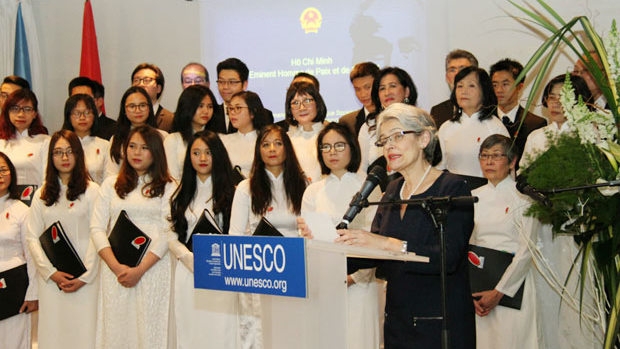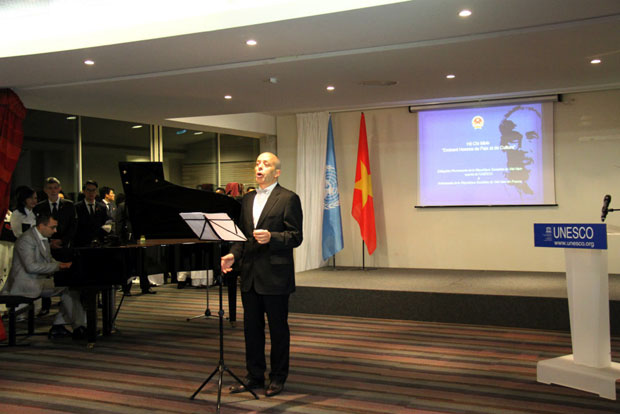Paris exhibition honours late President Ho Chi Minh
An exhibition dedicated to late President Ho Chi Minh opened in Paris, France on the evening of November 13 to mark the 30th anniversary of UNESCO’s Resolution 24C/18.65 in 1987, urging UNESCO member states to join in the commemoration of the centenary of the birth of the president (1890-1990).
 |
UNESCO Director-General Irina Bokova speaks at the event. (Credit: NDO)
The event was co-hosted by the Vietnamese Permanent Delegation to UNESCO and the Vietnamese Embassy in France.
In her opening speech, Tran Thi Hoang Mai, Ambassador and Head of the Vietnamese Permanent Delegation to UNESCO, affirmed that Resolution 18.65, adopted by the 24th General Conference of UNESCO in 1987, recognised that President Ho Chi Minh devoted all his life to the struggle for national liberation of the Vietnamese people, contributing to the common struggle of peoples for peace, national independence, democracy and social progress.
Ambassador Mai said President Ho Chi Minh is the national liberation hero and an outstanding symbol of cultural excellence. He left for the Vietnamese people an invaluable heritage, which is Ho Chi Minh Thought, not only about the Vietnamese revolutionary ideals, but also the vitally important role of education and culture for peace and development.
His writings, poems, essays and speeches reflect a deep understanding of human history and civilisation, as well as the belief in the power of cultures in the world of each person and every nation. These are also major goals pursued by UNESCO, the diplomat stated.
UNESCO Director-General Irina Bokova expressed her deep affection for the country and people of Vietnam, especially the respect for President Ho Chi Minh, through her three visits to Vietnam.
According to the UNESCO official, President Ho Chi Minh was a humanist and intellectual – a poet, a journalist, and a teacher, keenly aware of the power of education for national self-determination as well as for inpidual empowerment.
 |
Uncle Ho’s two poems set to music introduced at the event. (Credit: NDO)
In images displayed at the exhibition, President Ho Chi Minh’s extensive travel from East to West gave him a unique global perspective of the importance of dialogue between cultures as the foundation for mutual understanding, as the driver also of more inclusive and sustainable development, Irina Bokova affirmed.
The event was also an opportunity for Vietnam’s beloved French friends to relish the memories of events related to President Ho Chi Minh. Historian Alain Ruscio said that the comments of witnesses who met President Ho Chi Minh were the most vivid and concrete evidences of his great personality. He emphasised that 100 years ago, when the young Vietnamese arrived in Marseilles, no one thought that he would be the initiator of the struggle for national liberation, greatly contributing to the abolition of the colonial regime on the world.
Meanwhile, Hélène Luc, Honorary President of France-Vietnam Friendship Association, said that Vietnam today is the fruit of President Ho Chi Minh and the people of Vietnam have been steadily building in the past and will continue to build in the future.
On this occasion, two poems by President Ho Chi Minh "Toi doc - Je lis" and "Thu da - Nuit d'automne,” which were set to music by French composer Louis Durey, were presented by singer Mathieu Lécroart at the event.
At the 24th session of the UNESCO General Conference in Paris from October 20 to November 20 1987, the UNESCO adopted Resolution 24C/18.65 on the celebration of the 100th anniversary of President Ho Chi Minh's birthday, as “Vietnamese hero of national liberation and great man of culture” in 1990.
The resolution stated that the important and multifaceted contributions of Ho Chi Minh in the fields of culture, education and the arts crystalises the cultural traditions of the Vietnamese which stretches back several thousand years. His ideals embody the aspirations of peoples in the affirmation of their cultural identity and the promotion of mutual understanding.
UNESCO recommended its member states to join in the commemoration of the centenary of the birth of President Ho Chi Minh in 1990 by organising various events as a tribute to his memory, in order to spread knowledge of the greatness of his ideals and of his work for national liberation./.
VNF/NDO
Recommended
 Handbook
Handbook
Vietnam Moves Up 8 Places In World Happiness Index
 Handbook
Handbook
Travelling Vietnam Through French Artist's Children Book
 Multimedia
Multimedia
Vietnamese Turmeric Fish among Best Asian Dishes: TasteAtlas
 Handbook
Handbook
From Lost to Found: German Tourist Thanks Vietnamese Police for Returning His Bag
Popular article
 Handbook
Handbook
Prediction and Resolution for the Disasters of Humanity
 Handbook
Handbook
16 French Films To Be Shown For Free During Tet Holiday In Vietnam
 Handbook
Handbook
Unique Cultural and Religious Activities to Welcome Year of the Snake
 Handbook
Handbook



